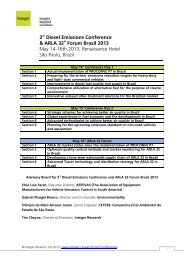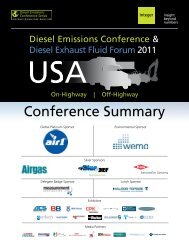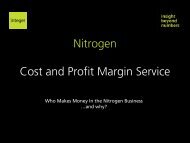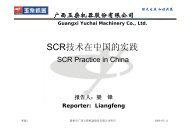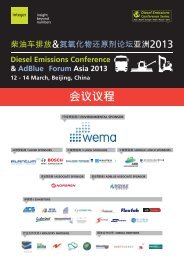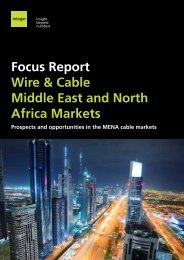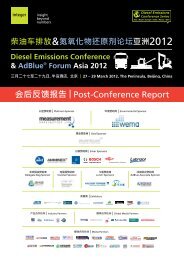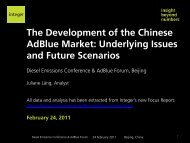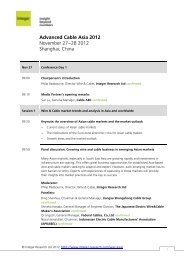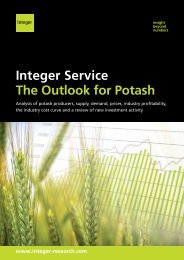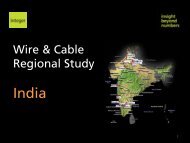Post-Conference Report - Integer Research
Post-Conference Report - Integer Research
Post-Conference Report - Integer Research
You also want an ePaper? Increase the reach of your titles
YUMPU automatically turns print PDFs into web optimized ePapers that Google loves.
in<br />
b<br />
n<br />
Analysis (cont.)<br />
in<br />
b<br />
n<br />
Lubricants, Ipiranga on the production and<br />
distribution of s1800, s500 and s50 diesel in Brazil.<br />
The sentiment from the service station chains and<br />
equipment provider representatives on the panel<br />
was that limited advance notice was given prior to<br />
the introduction of s50 diesel which meant that<br />
the upgrading of gas stations mandatorily required<br />
to stock s50 diesel was rushed and could have<br />
been much better managed. Market driven pricing<br />
was somewhat criticised, and comments from the<br />
floor questioned the government regulation of<br />
locations stocking s50 diesel when prices are not<br />
subject to the same level of intervention.<br />
Richard Petti, Chief Operating Officer, Wema<br />
System AS gave an overview of how Wema has<br />
approached the adoption of emissions legislation<br />
around the world. Wema has developed extensive<br />
experience through their work with ARLA sensor<br />
technology. Petti also stressed that the legislation<br />
in Brazil and around the world is too complex to<br />
copy technology systems from existing markets e.g.<br />
Europe or North America, and that a great deal of<br />
customisation is required at the regional level.<br />
Session 6: Further plans to introduce<br />
alternative fuel throughout Brazil<br />
Ricardo Gomide, Deputy Director of<br />
Renewable Fuels Department, Ministry of<br />
Mines & Energy kicked-off the session on<br />
alternative fuels with a presentation on the<br />
Brazilian biodiesel market since the introduction of<br />
B5 in 2010. One of the Ministry’s goals for energy<br />
policy is to increase biodiesel consumption, and this<br />
has been reflected in Brazil’s rise to prominence as<br />
the third largest biodiesel consumer globally over<br />
the last 5 years. The government’s energy plan<br />
forecasts biodiesel demand to rise by 50% to 3.8<br />
thousand cubic metres per year by 2020.<br />
Julio Minelli, Executive Director, APROBIO<br />
(Brazilian Biodiesel Producers’ Association)<br />
presented the campaign of the biodiesel industry<br />
to achieve a mandatory 20% biodiesel blend in<br />
regular diesel. There are now 37 plants that have<br />
been licensed as viable raw materials for biodiesel<br />
production and the paper was very timely given the<br />
announcement last week that Vale is investing in<br />
a palm oil-extraction plant in the Amazon to make<br />
B20 diesel. Minelli stated that the biodiesel chain<br />
is ready for the next steps in securing a supply of<br />
alternative fuel in Brazil, the land and raw materials<br />
are available but development of new oil seeds<br />
is required urgently given the typical 5-7 years<br />
required for new crops to mature.<br />
Minelli then moderated the next panel on the<br />
potential of biodiesel and alternative fuel for<br />
emissions reduction in Brazil, with Alfred Szwarc,<br />
Director, ADS Tecnologia e Desenvolvimento<br />
sustentável, Breno Kamei, Business<br />
Development Manager, IVECO Latin America<br />
Ltda., Eduardo Pinto, Head of Urban Buses<br />
Chassis Sales, Scania Brasil providing comment.<br />
70% of Brazil’s fuels are renewable and so it was<br />
important to discuss what the challenges and<br />
bottlenecks will be moving forward. All panellists<br />
mentioned the involvement of the government<br />
in setting legislation and the need for better<br />
defined policies that foster and value renewables.<br />
The technical complexity of biodiesels will be a<br />
challenge moving forward and the development<br />
should be aligned with other benchmarks being set<br />
such as CO2 savings.<br />
Session 7: Emissions reduction for<br />
non-road vehicles – plans to meet<br />
PROCONVE-MAR 1 requirements by<br />
2015<br />
Luis Chain Faraj, Marketing and Sales Director,<br />
Cummins Brasil Ltda. introduced the first nonroad<br />
session of the conference with a regulatory<br />
overview of emissions reduction for the sector<br />
ahead of MAR-1 implementation in 2015, and<br />
drew noteworthy correlations between the<br />
performance of the Brazilian economy and the<br />
production of agricultural machinery. Challenges<br />
exist in the use of SCR in off-road applications<br />
where space is at a premium and the discussion of<br />
<strong>Post</strong>-<strong>Conference</strong> Analysis: Diesel Emissions <strong>Conference</strong> & ARLA 32 Forum Brazil 2012<br />
7



